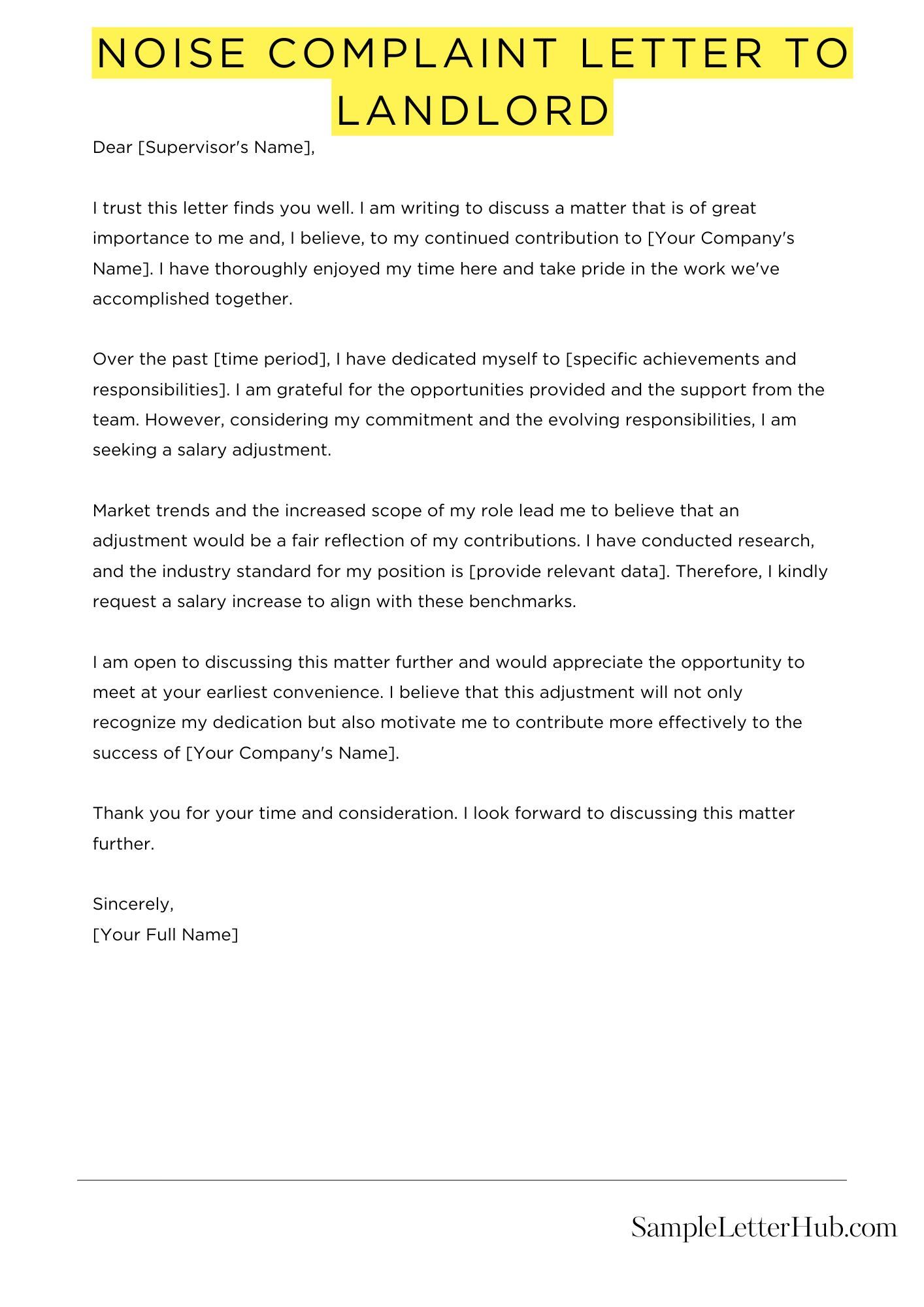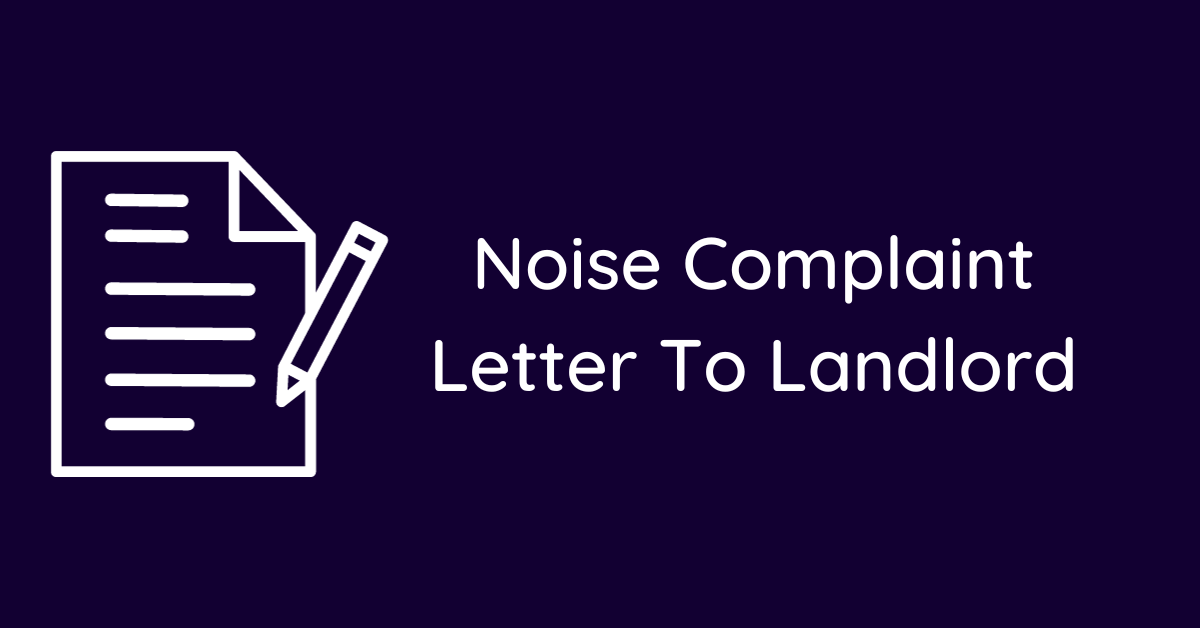

Are you tired of the noise coming from your neighbours? Do you feel like you’ve tried everything to get them to quiet down? Well, fear not! A noise complaint letter to your landlord may just be the solution you’ve been looking for.
It’s a formal letter written to your landlord to report a noise disturbance caused by another tenant. Its purpose is to request that your landlord takes action to remedy the situation and restore peace and quiet to your home.
In this article, we will be sharing templates, examples, and samples of noise complaint letter to landlords. We understand that writing a complaint letter can be stressful and time-consuming, especially if you’re not familiar with the format or language of such letters.
That’s why we want to make it easy for you by providing you with ready-to-use templates that you can customize to suit your specific situation. Whether it’s a noisy neighbour, construction work in the building, or any other noise issue, we’ve got you covered!
Our aim is to help you write an effective complaint letter that will get the attention of your landlord and ultimately resolve the noise issues you’re facing. So, sit back, relax, and let us guide you through the process of drafting a noise complaint letter to your landlord.
Dear [Landlord’s Name],
I hope this letter finds you well. I am writing to bring to your attention a matter that has been affecting my living conditions in the [Apartment/House] at [Address].
Unfortunately, there has been a recurring issue with excessive noise in the building, particularly during late hours. The disturbances have been disrupting my peace and affecting my ability to rest and concentrate on daily activities.
I understand that living in a shared space involves some level of noise, but the recent situation has been beyond what one might consider reasonable. The noise, especially during the night, is making it challenging for me to get a good night’s sleep, impacting my overall well-being.
I kindly request your assistance in addressing this matter promptly. It would be greatly appreciated if you could communicate with the residents or take the necessary steps to ensure that noise levels are kept within acceptable limits, as stated in the lease agreement.
Thank you for your understanding and cooperation in advance. I believe that with your intervention, we can create a more harmonious living environment for all residents.
If there are any procedures or guidelines in place for handling such situations, please let me know. I am open to any suggestions that will contribute to resolving this issue amicably.
Looking forward to your prompt attention to this matter.
Dear [Landlord’s Name],
I trust this message finds you well. I am writing to express my concerns regarding the persistent noise disturbance caused by my neighbors in [Apartment/House] at [Address].
Over the past few weeks, the noise levels have escalated to a point where it is adversely affecting my daily life. The loud music, late-night gatherings, and other disruptions have made it challenging for me to enjoy a peaceful and quiet living environment.
I understand that living in close proximity involves some level of noise, but the current situation goes beyond what one would reasonably expect. The disturbances are impacting my ability to concentrate on work and hindering my overall well-being.
I kindly request your assistance in addressing this matter promptly. It would be greatly appreciated if you could communicate with the neighbors or take appropriate measures to ensure that noise levels are kept within acceptable limits, as stipulated in the lease agreement.
Your prompt attention to this matter is crucial, and I believe it will contribute to fostering a harmonious living environment for all residents in the building.
If there are any established procedures or guidelines for handling such situations, I would appreciate it if you could inform me accordingly. I am open to any suggestions that will help resolve this issue amicably.
Thank you for your understanding and cooperation. I look forward to a swift resolution to this matter.
Dear [Landlord’s Name],
I trust this message finds you well. I am reaching out to address an issue that has been affecting my living situation in the [Apartment Name] at [Address].
Regrettably, there has been a consistent problem with excessive noise within the building, particularly during late hours. The disruptive sounds have been making it challenging for me to relax and enjoy a peaceful home environment.
Living in close quarters requires a certain level of consideration for neighbors, and unfortunately, the current noise levels surpass what one might consider reasonable. The disturbances, especially during the night, are impacting my ability to get a good night’s sleep and affecting my daily activities.
I kindly request your assistance in addressing this matter promptly. It would be highly appreciated if you could communicate with the residents or take the necessary steps to ensure that noise levels are kept within acceptable limits, as outlined in the lease agreement.
Your attention to this matter will not only enhance the quality of life for me but for all residents in the building. If there are established procedures for handling such situations, please inform me, and I am willing to cooperate to find an amicable solution.
Thank you for your understanding and prompt action. I look forward to a resolution that fosters a more peaceful living environment for all.
Dear Residents of [Apartment/House] at [Address],
I hope this letter finds you well. I am writing to bring to your attention a matter that has been impacting the overall living experience in our community.
Recently, there have been ongoing disturbances related to excessive noise within the building. While we all understand that shared living requires some level of tolerance, the current situation has exceeded what is considered reasonable.
It has come to my notice that the noise levels, especially during late hours, have been causing inconvenience to many residents. This includes loud music, parties, and other disruptive activities that are affecting the tranquility of our living space.
I kindly request everyone’s cooperation in maintaining a peaceful environment. It’s essential that we all contribute to ensuring that noise levels are kept within acceptable limits, particularly during the evening and night hours.
Respecting each other’s need for quiet and relaxation is crucial for fostering a positive living experience for everyone. I believe that, with mutual understanding and consideration, we can create a harmonious community where everyone feels comfortable in their homes.
Thank you for your attention to this matter. Let’s work together to make our living space enjoyable for all.
I trust this letter finds you in good health. I am writing to address a matter that has been affecting the peace and quiet of our shared living space at [Address].
While I understand that living in close quarters requires a certain level of tolerance, the noise levels emanating from your residence have become a persistent issue. The loud music, late-night gatherings, and other disturbances are making it challenging for me to enjoy a peaceful and relaxing home environment.
I kindly request your cooperation in keeping the noise to a reasonable level, especially during the evening and night hours. It’s essential for all residents to contribute to maintaining a harmonious living atmosphere.
Respecting each other’s need for tranquility is vital in creating a positive community experience for everyone. I believe that with mutual understanding, we can find a solution that ensures a comfortable living environment for all residents.
Thank you for your attention to this matter. I look forward to a positive change that benefits the well-being of our community.

Living among neighbors can be pleasant, sometimes there comes a time when your peace is disturbed by their loud noise. This article aims to guide you on how to write a noise complaint letter to address such issues with your neighbors.
The first step to writing an effective noise complaint letter is to identify the cause of the noise. Note down when the noise occurs, how long it lasts, and the type of noise. This will help you to determine if the noise is reasonable or if it violates any HOA rules and regulations.
The tone of your complaint letter should be calm and cordial at all times, even if you are experiencing anger or frustration. Avoid using derogatory or insulting language, and focus on the facts of the matter, highlighting the issue you are facing.
Ensure you follow a professional format when drafting your complaint letter. Address your neighbors politely, state the problem, provide evidence, and suggest ways in which the situation can be rectified.
In your complaint letter, provide concrete examples of how the noise is disturbing you, such as sleep disruption, inability to concentrate, or a decrease in the quality of life. This will help your neighbor to understand how the noise is negatively affecting you.
Along with detailing the issue, suggest possible solutions in your complaint letter. This will demonstrate that you are willing to work with your neighbor to resolve the issue. For instance, you may suggest they reduce the noise level by decreasing the volume of the music or using soundproofing materials.
Before submitting the complaint letter, have a trusted friend or advisor read it. This will ensure that your letter is clear, concise, and sensitive in terms of tone.
Keep a record of your noise complaints as they occur, including the date, time, and type of noise. This documentation may be useful in case future legal action becomes necessary, and it demonstrates that you have taken reasonable steps to resolve the issue.
In conclusion, writing a noise complaint letter involves taking a calm and professional approach to a difficult issue. By following the guidelines mentioned, you can create an effective, persuasive letter that may help you regain the peace in your living space.

Excessive, unwanted noise can be a severe disturbance to anyone, making it a compelling reason to write a noise complaint letter.
Whether it’s a loud party next door, a noisy mechanical system, or a barking dog disturbing your peace, writing a letter can be an effective way to address the issue.
Before writing a noise complaint letter, it’s essential to take several steps that help you address the situation positively.
Firstly, talk to your affected neighbor politely and reasonably, describe how their noise is impacting your well-being, and ask them to keep it down.
If the noise persists after trying this first approach, take a second step and document the noise with dates, times, or anything specific that helps when lodging your complaint.
This step ensures that you have enough proof to support your complaint in case you need it later.
After documenting the noise, check the laws that regulate noise in your jurisdiction. Some communities have specific rules that require neighbors, landlords, or businesses to comply with the ordinances.
It’s also important to explore any non-legal avenues you might be able to take to resolve the issue, such as mediation services or landlord/tenant arbitration.
Putting your complaint in writing is essential as it formalizes your complaint and puts it on record. A well-written noise complaint letter can also be a useful reference when addressing further steps or escalating the case.
Writing a letter allows you to clarify your thoughts and feelings on the matter while communicating your expectations to the responsible party.
Moreover, letters have a formal tone that commands respect and shows that you mean business. A clear, concise, and well-structured letter ensures that the recipient takes your complaint seriously and positively understands your point of view.
If you’re dealing with noise problems that are disrupting your peace of mind, one of the best ways to handle it is to communicate your concerns to your landlord or property manager in the form of a noise complaint letter.
However, before you do that, there might be some questions that you need answered. In this article, we’ll answer some of the most frequently asked questions about noise complaint letters to landlords.
A noise complaint letter to the landlord is a formal communication from a tenant to the landlord or property manager that outlines the noise problems that the tenant is experiencing. This letter serves as a written documentation of the problems and sets a clear expectation for the landlord to take action.
In your noise complaint letter to the landlord, include the date and time of the noise disturbances, describe the type of noise (e.g., loud music, barking dogs, shouting, etc.), describe how the noise is affecting you, and request that the landlord take appropriate action to address the problem.
Address the noise complaint letter to the landlord or property manager by including their full name, the name of the rental property, and the specific apartment or unit number in the greeting line. For example, “”Dear [Landlord’s Name], I am writing to you regarding noise disturbances in Apartment [Unit Number].””
After sending the noise complaint letter to the landlord, give them a reasonable amount of time to respond and take action. If you don’t receive a response or the situation doesn’t improve, you may need to escalate the complaint to the appropriate local authorities.
It is possible to break your lease if the noise problems are severe enough and the landlord has not taken appropriate action to address them. However, breaking a lease should be a last resort and generally requires legal advice.
It is generally not legal to withhold rent because of noise problems. Instead, you should follow the appropriate legal process to address the issue. Withholding rent can result in legal consequences and damage to your credit score.